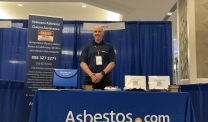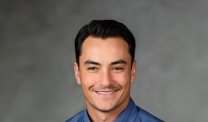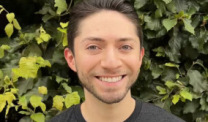2023 ADAO Asbestos Conference: Prevention Is the Best Medicine
AdvocacyWritten by Sean Marchese, MS, RN | Edited By Walter Pacheco
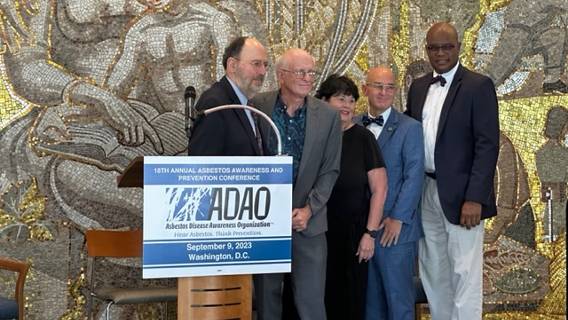
The Mesothelioma Center’s Sean Marchese attended the 2023 Asbestos Disease Awareness Organization’s 18th Annual Asbestos Awareness and Prevention Conference in Washington, D.C. This is the second of two blogs he wrote for Asbestos.com outlining the inspiring and uplifting talks at the conference.
The Medical Perspective
I was glad to see an emphasis on current trends in asbestos-related medical care during the 2023 ADAO Asbestos Awareness and Prevention Conference. Several medical doctors, surgeons and oncologists discussed the latest considerations in mesothelioma treatment. One of my biggest takeaways from this topic was the increased need for early screening.
Dr. Andrea Wolf
The expert who stressed this point the most was Dr. Andrea Wolf, who highlighted how clinicians should ask better questions to catch asbestos-related diseases sooner. Wolf is director of the New York Mesothelioma Program and associate professor of thoracic surgery at Mount Sinai Icahn School of Medicine.
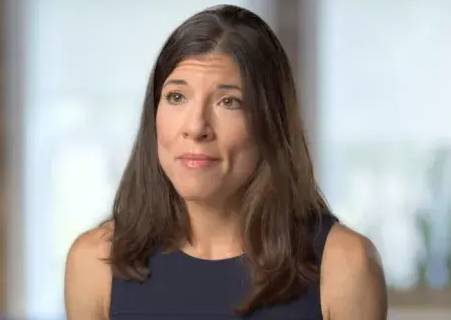
Wolf started her talk by reiterating that “there is currently no known good screening test for mesothelioma or asbestos-related diseases.” Low-dose chest CT screening and breathing function tests may be helpful, but there is a need for more tools in the diagnostic toolbox.
“Early diagnosis of asbestos-related disease can help minimize patient suffering and maximize their chance of survival,” she emphasized.
Wolf also recounted a story of a patient who underwent an invasive extrapleural pneumonectomy surgery to remove the cancerous lung and parts of the pleura, pericardium and diaphragm. The patient is still alive nine years later, thanks to his health care providers’ early diagnosis and quick action.
Wolf concluded her talk by confirming, “As long as you feel well, you are well, and we will fight with you by your side.”
Dr. Raja Flores
It was a sentiment Dr. Raja Flores, chairman of the Department of Thoracic Surgery at Mt. Sinai, echoed. Flores reflected on the need for aggressive legislation. He said many people are surprised when they find out that asbestos is still not banned in the United States.
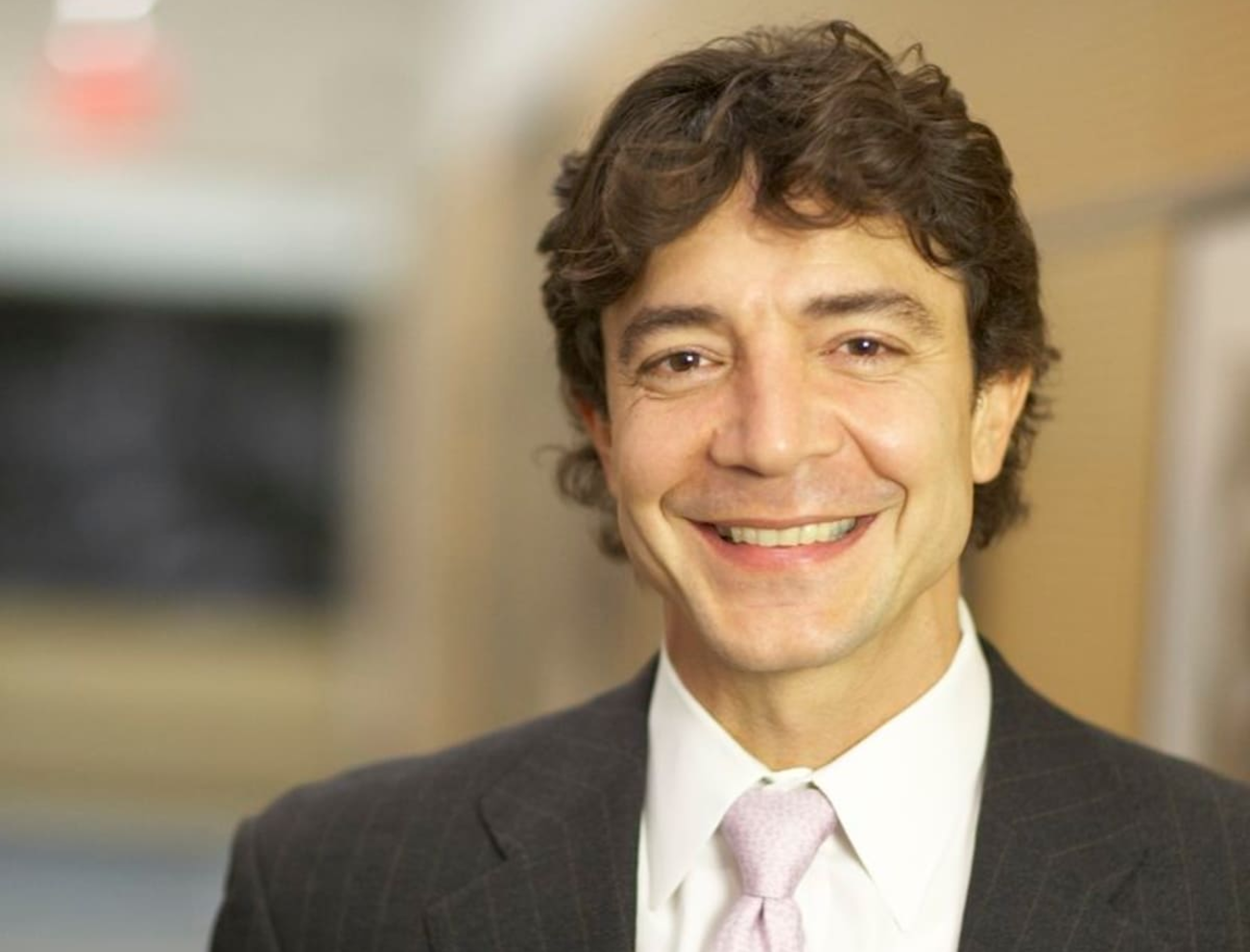
“American politicians have chosen to look the other way. I cannot look the other way. It is a disease I battle every day in the operating room, cutting out cancer-ravaged lungs and other body parts for a disease that is 100% preventable,” Flores said.
“No asbestos. No mesothelioma. It is that simple. Congress … you can save more lives with the stroke of a pen than I can with a cut of my scalpel.”
Dr. Steven Markowitz
Later in the day, we heard from Steven Markowitz, MD, DrPH, an occupational medicine physician and epidemiologist. Markowitz directs the Barry Commoner Center for Health and the Environment at Queens College, City University of New York, and is an ADAO Science Advisory Board member.
Markowitz shared statistics that I was surprised to hear. While asbestos-related lung cancer claims up to 10 times more lives than mesothelioma, less than 20% of eligible people get a low-dose CT scan for screening.
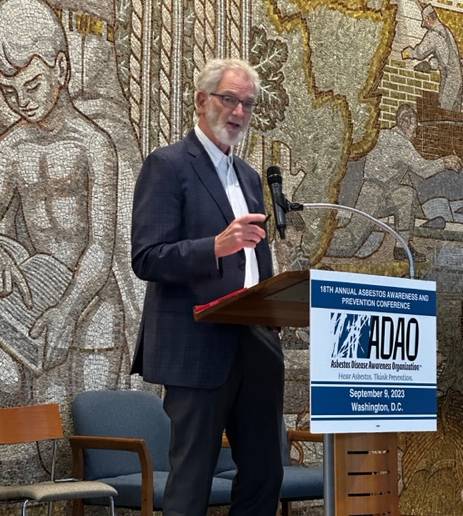
“When lung cancer is detected early, 85% to 90% of people survive,” emphasized Markowitz.
During his talk, Markowitz tied together many of the overlying themes from the other medical experts. Clinicians should consider the risk factors of older adults who smoke or have a family history of cancer. They should also ask specific questions about prior workplaces and occupations.
“Demand a low-dose CT scan,” he concluded. “It’s our job to make that happen.”
A Need for Global Viewpoints
As the conference drew to a close, I found the presentations from global representatives to be the most sobering. I heard personal stories from anti-asbestos advocates who had felt the effects of asbestos disease and how those experiences connected to the devastating effects of asbestos abroad.
Harminder Baines, JD, a partner at Leigh Day law firm in London, lost her father to mesothelioma. She has since become a leading litigator in the country to protect the rights of citizens affected by asbestos. I was stunned as Baines recalled infiltration and intimidation attempts by agencies looking to discredit esteemed doctors and their research.
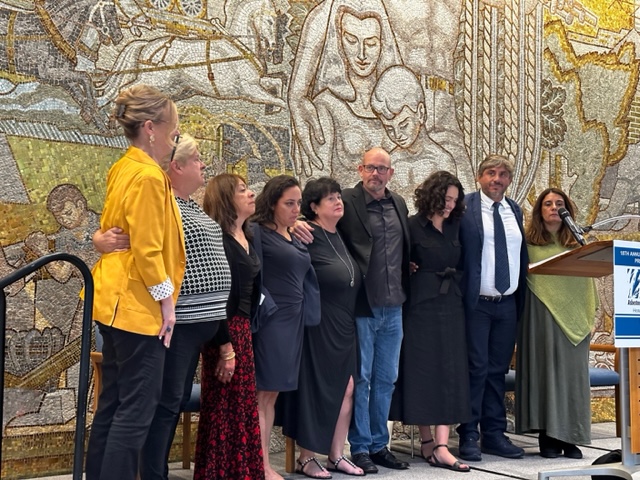
She also described how asbestos is being imported into India from other countries.
“There are companies still manufacturing asbestos goods,” she said. “They’re exporting their dirty asbestos to Asian countries that are building asbestos cement buildings, hotels and apartments.”
Civil and occupational safety engineer Fernanda Giannasi was a labor inspector for 30 years at the Brazilian Labor Ministry. She founded the Brazilian Association of People Exposed to Asbestos. Giannasi and Brazilian labor prosecutor Sefora Graciana Cerqueira Char discussed the long road to the recent Brazilian Federal Supreme Court decision to uphold its asbestos ban.
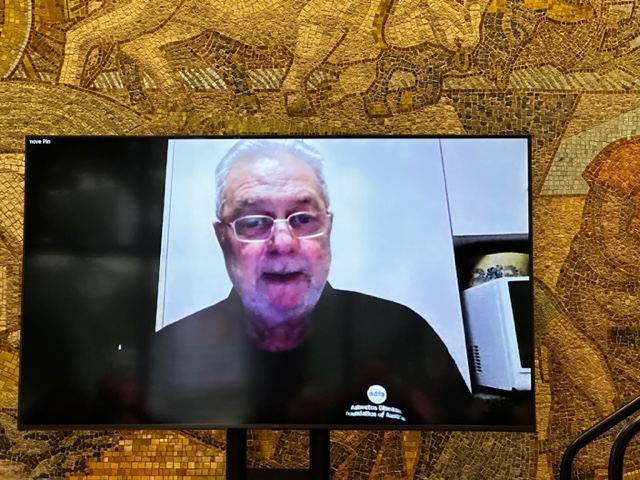
Speaking from Australia, Barry Robson, president of the Asbestos Disease Foundation of Australia, described his country’s perspective on asbestos mitigation and elimination.
“Here in Australia, we’re celebrating 20 years of the total ban on asbestos, yet the number of victims has not decreased,” he said. “We still lose about 700 Australians from mesothelioma per year. The numbers are not going down. We’re still seeing the results of not having that ban for 70 years.”
The day’s final presentation came from Carmen Lima, founder and coordinator of the Portuguese Association Against Asbestos. Lima outlined the lack of knowledge about asbestos-related diseases in Portugal. She noted that 98% of the country’s occupational diseases are unreported.
Lima emphasized the need to increase Portugal’s scientific resources and government support to those impacted by asbestos and their families. These efforts would improve the political and social influence of anti-asbestos advocates.
“We have a lot of work to do,” Lima said.
Based on what I learned at the 2023 ADAO Asbestos Awareness and Prevention Conference, I agree with Lima’s sentiment. We have a lot of work ahead of us in the United States to ban asbestos and remove it from our infrastructure. There is also a significant need for global efforts and political action to stop the exportation of asbestos-containing materials.
I’m exceptionally grateful to Linda Reinstein and the ADAO for their efforts in organizing such an influential conference for nearly two decades. It was simultaneously a touching memorial to lives lost and a call to action for needed change. I look forward to next year’s conference and the effects of another year of advocacy and support toward the complete ban on asbestos.

